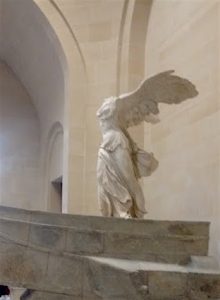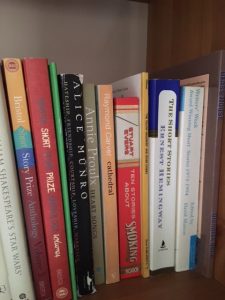This Week’s Bit of String: Though she be little…
When I was a teaching assistant, most of my students were taller than I was. During my first year, I supported a particularly boisterous Year 9 class, and as I was trying to settle them one day, a very tall boy who later got expelled for bringing brass knuckles to school loomed over me with a grin. ‘Miss, you’re small.’
‘Yes—but mighty. Sit down!’ And would you believe it, he did. For a little while.

Any fans of art and literature will know decreased size doesn’t detract from power. At the Louvre, I was struck by how small the Mona Lisa was—seemingly no bigger than a standard A4 sheet of paper. Meanwhile, on the opposite wall hung a massive depiction of the wedding at Cana, Jesus’ first miracle. Which does everyone remember? By creating a small portrait, Da Vinci drew focus to just one figure, and the nuances of her expression. With large-scale pictures of entire scenes, it’s hard for viewers to settle their attention.
Beginning, Middle, and End
So it can be with short stories versus novels. I’ve written previously about the implications of each literary form, but I’ve been doing more short story research lately. I covered Raymond Carver and Alice Munro, since they’re seen as greats in the genre, and I read a volume by Annie Proulx, because I loved The Shipping News. As someone always seeking story ideas (knowing that many of those ideas will turn only into notes, snapshots, or vignettes rather than actual stories), I enjoyed studying these works and wondering, What was the starting point for this story? How did the writer make it work?
Certainly the hardest thing for me in turning an idea into a story is ensuring development; pinpointing a beginning, middle, and end. The short story is more flexible than the novel. Equal attention need not be paid to beginning, middle, and end—one or more can merely be implied. Munro likes starting stories with a little anecdote that happens later, or with someone looking back to a seemingly random detail. And a few of Carver’s and Proulx’s stories left the endings ambiguous.

My favourites were a couple of Carver’s stories, “Cathedral” and “A Small Good Thing,” both stories that realistically but surprisingly diffused tension between very different characters with warmth. I also loved Annie Proulx’s “The Unclouded Day,” not just for its great title and the description of my native New England wild places. There was its completeness, and humour with just enough insight into the protagonist to sense good intentions. Again, there was warmth in this story.
That’s my personal taste: a story can narrate a bleak event (for example, the death of a child, as in “A Small Good Thing”), so long as there’s an element of kindness between at least a couple of the characters. And yes, I do like a decent arc, no matter how short: you don’t have to give me the pot of gold at the end of the rainbow, but I’d jolly well like an idea of where the colours lead.
Short Story Round-Up
On Twitter, I asked about other writers’ favourite short stories, and their own criteria for a great one. Stephen Tuffin, who recently judged and hosted a fabulous new event, The Squat Pen Rests championship in short fiction, provided a thorough endorsement of Truman Capote. I have to agree; his “A Christmas Memory” is my absolute favourite in the festive season.
Stephen also tweeted about what makes a great story: ‘A great short has to leave me with an afterglow. As if I’ve been gifted something meaningful and relevant. Great shorts need more reader input but the effort is rewarding and leaves me feeling I’ve been shown another world, different but the same as my own.’

Fantasy author Grace Crandall recommends Ray Bradbury’s stories. I had actually read “The Foghorn” just the other week, when a friend at a discussion group provided it as an example of a great, atmospheric tale. Grace says, ‘‘‘The Rocket” and “The Beggar of O’Connell Bridge” are two of my favorites of his. I think a big key to short stories is having a conclusive emotional arc, and he’s such an expert at delving into human nature and feelings.’
Science fiction writer Madd_Fictional, curator of celebrated writing hashtag #SlapDashSat, recommends Harlan Ellison: ‘Nothing like a good speculative fiction short story that presents a left-of-center theme, laced with poignant social commentary that usually features protagonists who are morally ambiguous.’ Sounds good to me!
Finally, Laurie Garrison of the invaluable Women Writers School pointed me toward Kate Chopin’s “The Story of an Hour,” because it portrays ‘a whirlwind of emotion in just a few hundred words. And there’s such brilliant irony to it.’ It’s another perfect little complete tale.
What are your favourite short stories, and have you encountered any particular challenges in reading or writing them?